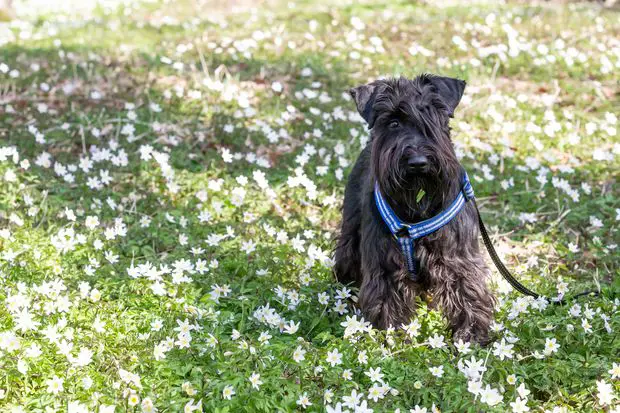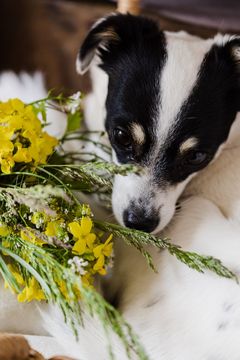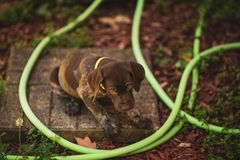Jasmine plants boast some of the most vibrant and exquisite flowers found in nature. Whether you seek to enhance your landscape, add a pop of colour to your garden, or bring beauty indoors as a houseplant, Jasmine is a surefire winner. It elevates your gardening and landscaping endeavours to new heights, leaving a lasting impression.


Renowned for its elegant white blossoms and distinctive tropical fragrance, Jasmine captivates the senses and creates an enchanting atmosphere. It's a timeless beauty and the alluring scent makes it a cherished favourite among plant enthusiasts and gardeners alike.
One of the many remarkable qualities of Jasmine is its ability to bloom consistently throughout the year. This remarkable attribute makes it a versatile and favourite choice for gardeners, but is Star Jasmine toxic to dogs?
Yes, Star jasmine (Trachelospermum jasminoides) is toxic to dogs. Ingesting any part of the plant can cause various symptoms like vomiting, diarrhea, drooling, and skin irritation. It's important to keep your dogs away from Star Jasmine to ensure their safety.

Is Star Jasmine poisonous to dogs?
As pet owners, we strive to create a safe and nurturing environment for our beloved furry friends. When it comes to our gardens and indoor plants, it's crucial to be aware of any potential risks to ensure the well-being of our canine companions. In this article, we will delve into the topic of Star Jasmine (Trachelospermum jasminoides) and its potential effects on dogs. By understanding the facts and separating myth from reality, you can make informed decisions to keep your furry friend safe and your garden flourishing.

Star Jasmine, with its delicate white blossoms and intoxicating fragrance, is a popular choice for many garden enthusiasts. Its vining nature and ability to create lush green walls make it a visually appealing addition to outdoor spaces. However, as responsible dog owners, it is important to assess whether this beautiful plant poses any risks to our canine companions.
There is much speculation and conflicting information regarding the toxicity of Star Jasmine to dogs. Some sources claim it to be highly toxic, while others suggest it is safe for canine interaction. To provide clarity, we will explore the scientific evidence and reliable reports to determine the actual risks associated with Star Jasmine ingestion by dogs. By relying on factual information, we can dispel myths and misconceptions, ensuring the safety and well-being of our furry friends.
To shed further light on the topic, we will share real-life experiences and expert insights from veterinarians and horticulturists. By hearing stories from pet owners and professionals, we can gain a deeper understanding of the potential effects of Star Jasmine on dogs. These firsthand accounts and expert advice will equip you with the knowledge needed to make informed decisions when it comes to cultivating this fragrant vine in the presence of your canine companions.
Ensuring the safety of our dogs is of utmost importance, and understanding the potential risks associated with plants like Star Jasmine is an essential part of responsible pet ownership. By exploring scientific evidence, separating fact from fiction, and considering real-life experiences, we can make informed choices that prioritize the well-being of our furry friends. Stay tuned as we delve deeper into this topic, providing you with accurate information and practical tips to keep your dogs safe in a garden filled with beauty and fragrance.
Are dogs allergic to star jasmine?
As dog owners, we cherish the moments spent with our furry friends, watching them explore the world around them with boundless curiosity. However, we also know that dogs, like humans, can have allergies that may cause discomfort or even health issues. When it comes to star jasmine, a plant known for its captivating fragrance and beauty, it's natural to wonder if our canine companions might have any allergic reactions. Let's delve into this topic and uncover the truth about dogs and star jasmine allergies.
First and foremost, it's important to understand that every dog is unique, just like us. While some dogs may be more sensitive to certain allergens, others may have no reaction at all. It's all about individual sensitivities and the specific immune response of each dog.

When it comes to star jasmine, there is no concrete evidence to suggest that dogs are specifically allergic to this plant. However, it's worth noting that dogs can be allergic to various environmental factors, including pollen, grasses, and certain plants. If your furry friend has previously shown signs of plant allergies or sensitivities, it's advisable to monitor their interaction with star jasmine.
The most common signs of allergies in dogs include itching, redness, excessive scratching, sneezing, watery eyes, and even gastrointestinal issues. If you observe any of these symptoms after your dog's exposure to star jasmine, it's essential to consult with a veterinarian for a proper diagnosis.
Remember, prevention is better than cure. If you suspect your dog may have sensitivities to star jasmine or any other plant, it's wise to limit their access or create a designated pet-friendly area in your garden. This ensures that your furry friend can still enjoy the outdoor environment while minimising potential allergic reactions.
As responsible dog owners, our priority is always the well-being and happiness of our four-legged companions. While star jasmine is generally considered safe for dogs, being aware of their individual sensitivities and monitoring their behaviour around plants is crucial. By observing their reactions and seeking veterinary advice when needed, we can ensure a harmonious and allergy-free environment for our beloved dogs to thrive in.

If you suspect that your dog has ingested star jasmine and is exhibiting mild allergic reactions such as itching or redness, it's important to take immediate action. First, remove your dog from the area with star jasmine to prevent further exposure. Offer your dog fresh water to drink and observe their behaviour closely. If the symptoms persist or worsen, it's best to contact your veterinarian for guidance and potential treatment options. Remember, timely intervention can help alleviate your dog's discomfort and ensure their well-being.
Please note that in cases of severe allergic reactions or if you suspect your dog has ingested a significant amount of star jasmine, it's crucial to seek immediate veterinary assistance. Allergic reactions can vary in intensity, so it's important to prioritize your dog's health and well-being by consulting with a professional.
Which jasmine is poisonous to dogs?
Jasminoids
Jasminoids are a group of plants that resemble true jasmine but are not part of the Jasminum genus. One common example is Confederate Jasmine (Trachelospermum jasminoides). These plants, although often referred to as jasmines, are generally considered non-toxic to dogs. However, individual dogs may have different sensitivities, so it's always best to monitor their interactions and consult with a veterinarian if any unusual symptoms occur.

Jessamines
Jessamines, such as Yellow Jessamine (Gelsemium sempervirens), are a separate group of flowering plants. While jessamines may have similar names and appearances to jasmine, they are not true jasmine plants. Some jessamines, particularly Yellow Jessamine, are known to contain toxic compounds that can be harmful to dogs if ingested. It's crucial to prevent your dog from accessing these plants and seek immediate veterinary attention if you suspect ingestion or notice any adverse symptoms.

Other Jasmine Varieties
Aside from true jasmine (Jasminum spp.), there are various jasmine-related plant varieties. While some of these may share similar names or fragrances, not all are toxic to dogs. However, it's important to research each specific variety and consult reliable sources to determine their potential toxicity before introducing them into your home or garden.
Is star jasmine toxic to pets?
When it comes to the safety of other pets and animals that may encounter star jasmine in your garden, it's important to exercise caution. While star jasmine (Trachelospermum jasminoides) is not typically considered highly toxic to pets, certain animals may still be sensitive to its effects.
Birds: Birds are generally less prone to toxicity from star jasmine. However, it's advisable to prevent them from ingesting large amounts of plant material, as excessive consumption could potentially cause digestive disturbances.
Small mammals: Pets such as rabbits, guinea pigs, and hamsters should be kept away from star jasmine, as they may be more susceptible to plant toxicity. Ingesting parts of the plant can lead to digestive upset or other adverse reactions.
Wildlife: If your garden attracts wildlife, it's essential to consider their potential interactions with star jasmine. Animals like squirrels, raccoons, or deer may browse on plant material. While star jasmine is generally not considered highly toxic, it's best to discourage excessive consumption to prevent any potential adverse effects.

Final thoughts
Remember to create a pet-friendly garden environment by providing safe and suitable spaces for your furry friends to explore and play. While star jasmine is generally considered low in toxicity, it's always important to monitor your pets' interactions with any plants in your garden. If you observe any unusual symptoms or suspect that your pet has ingested star jasmine, it's best to consult with a veterinarian for proper guidance and care.
By being mindful of the plants in your garden and taking proactive measures to ensure the well-being of your pets and other visiting animals, you can create a harmonious and safe outdoor space for everyone to enjoy.
